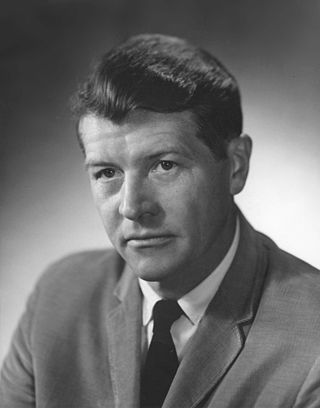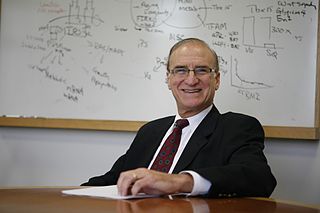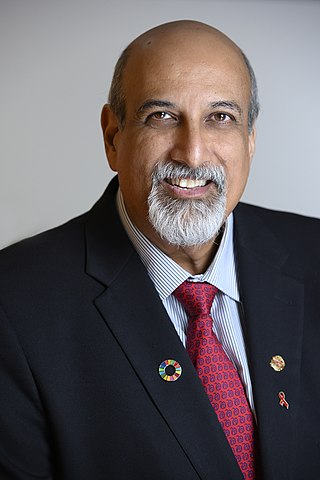
Sogndal is a municipality in Vestland county, Norway. It is located on the northern shore of the Sognefjorden in the traditional district of Sogn. The village of Hermansverk is the administrative center of Sogndal municipality. Other villages include Kaupanger, Kjørnes, Fimreite, Nornes, and Fjærland. Sogndal Airport, Haukåsen is located 10 kilometres (6.2 mi) southwest of Kaupanger.

The Norwegian University of Science and Technology is a public research university in Norway and the largest in terms of enrollment. The university's headquarters is located in Trondheim, with regional campuses in Gjøvik and Ålesund.

Christian Boehmer Anfinsen Jr. was an American biochemist. He shared the 1972 Nobel Prize in Chemistry with Stanford Moore and William Howard Stein for work on ribonuclease, especially concerning the connection between the amino acid sequence and the biologically active conformation.

Sports science is a discipline that studies how the healthy human body works during exercise, and how sports and physical activity promote health and performance from cellular to whole body perspectives. The study of sports science traditionally incorporates areas of physiology, psychology, anatomy, biomechanics, biochemistry, and kinesiology.

Western Norway University of Applied Sciences or HVL is a Norwegian public institution of higher education, established in January 2017 through the merging of formerly independent colleges across five campuses: Bergen, Førde, Haugesund, Sogndal and Stord. Its oldest programs - teacher education in Stord - can be traced to 1839. The total number of students at HVL is about 16000, and there are 1800 academic and administrative staff. Its main campus is in the Kronstad neighborhood of Bergen, Norway.
Aberdeen University School of Medicine, Medical Sciences & Nutrition contains the Medical School and Dental School at the University of Aberdeen in Scotland. It also provides training and carries out research in medical sciences, nutrition, public health, dentistry, health sciences, physician associate studies at BSc, MSc, and PhD levels. The current school was formed from the merger of the former School of Medicine & Dentistry, School of Medical Sciences, and the Rowett Institute of Nutrition.

Eva Lucille Feldman is an American physician-scientist who is a leading authority on neurodegenerative disease. She serves as the Russell N. DeJong Professor of Neurology at the University of Michigan, as well as Director of the NeuroNetwork for Emerging Therapies and ALS Center of Excellence at Michigan Medicine. She was also named the James W. Albers Distinguished University Professor of Neurology.
Richard Graeme Larkins is the former Chancellor of La Trobe University. He was the Vice-Chancellor and President of Monash University from 2003 to June 2009. Prior to this, he had a distinguished career in medicine, scientific research and academic management.
Sogn and Fjordane University College was a Norwegian state institution of higher education, in the county of Sogn og Fjordane. The college is now part of Høgskulen på Vestlandet.
Åsmund Ragnar Reikvam is a Norwegian professor in medicine and former politician.
Bjarte Erling Eikeset was a Norwegian lawyer, judge and politician for the Conservative Party.
Professor Murray David Esler, is a clinical cardiologist and medical scientist, based at the Baker Heart and Diabetes Institute and the Alfred Hospital in Melbourne, where he is the Associate Director of the Heart Centre. He is a Professor of Medicine at Melbourne's Monash University. As Associate Director of the Baker, Professor Esler leads the Institute’s research into the relationship between the brain and heart health. He studied medicine at the University of Melbourne and received a PhD from the Australian National University. His chief research interests are the causes and treatment of high blood pressure and heart failure, the effects of stress on the cardiovascular system, and monoamine transmitters of the human brain.
Daniel Willett Foster was the John Denis McGarry, Ph.D. Distinguished Chair in Diabetes and Metabolic Research and Professor of Internal Medicine at the University of Texas Southwestern Medical School at Dallas. He was Chairman of the Department of Internal Medicine for 16 years. He was a Fellow of the American Academy of Arts and Sciences, a Fellow of the American Association for the Advancement of Science and a member of the Institute of Medicine of the National Academies. He was a Master of the American College of Physicians. He was also a former member of the President's Council on Bioethics.

Albert Gjedde: is a Danish-Canadian neuroscientist. He is Professor of Neurobiology and Pharmacology at the Faculty of Health Sciences and Center of Neuroscience at the University of Copenhagen. He is currently also Adjunct Professor of Neurology and Neurosurgery in the Department of Neurology, Montreal Neurological Institute, McGill University, Montreal, Quebec, Canada, Adjunct Professor of Radiology and Radiological Science in the Division of Nuclear Medicine, Department of Radiology and Radiological Science, Johns Hopkins University, Baltimore, Maryland, US, Adjunct Professor of Translational Neuropsychiatry Research, University of Southern Denmark, Odense, Denmark, and adjunct professor of psychiatry at Tabriz University of Medical Sciences, Tabriz, East Azerbadjan, Iran.
Michael Cowley FTSE is an Australian physiologist. He is best known for his mapping of the neural circuits involved in metabolism and obesity and diabetes treatment. He is a professor in the Department of Physiology at Monash University in the Faculty of Biomedical and Psychological Sciences. He is also a director of the Australian diabetes drug development company, Verva Inc, and director of the Monash Obesity & Diabetes Institute] (modi).

Carl Ronald Kahn is an American physician and scientist, best known for his work with insulin receptors and insulin resistance in diabetes and obesity. He is the Chief Academic Officer at Joslin Diabetes Center, the Mary K. Iacocca Professor of Medicine at Harvard Medical School and a member of the National Academy of Sciences since 1999.

Salim S. Abdool Karim, MBChB, MMed, MS(Epi), FFPHM, FFPath (Virol), DipData, PhD, DSc(hc), FRS is a South African public health physician, epidemiologist and virologist who has played a leading role in the AIDS and COVID-19 pandemic. His scientific contributions have impacted the landscape of HIV prevention and treatment, saving thousands of lives.
Pavel Hamet is a doctor, researcher, editor, academic administrator and teacher in Quebec, Canada.

Anoop Misra is an Indian endocrinologist and a former honorary physician to the Prime Minister of India. He is the chairman of Fortis Centre for Diabetes, Obesity and Cholesterol (C-DOC) and heads, National Diabetes Obesity and Cholesterol Foundation (NDOC). A former Fellow of the World Health Organization at the Royal Free Hospital, UK, Misra is a recipient of the Dr. B. C. Roy Award, the highest Indian award in the medical category. The Government of India awarded him the fourth highest civilian honour of the Padma Shri, in 2007, for his contributions to Indian medicine.
David Joshua Handelsman, (AO) is trained in Medicine and Endocrinology. His expertise is in testicular function and androgen physiology, pharmacology, and toxicology. His experience spans basic, clinical, and public health domains including a recent focus on genetic models of androgen action, steroid mass spectrometry, and anti-doping science. He was Australia's first Professor in Reproductive Endocrinology and Andrology. He has worked in the US, Australia, and Germany. His professional involvement includes the World Health Organization (WHO) Human Reproduction Programme's Male Task Force, the United Nations Fund for Population Activities, Endocrine Society of Australia, World Anti-Doping Agency's Health, Medicine and Research Committee, and Australian Drug Evaluation Committee.









